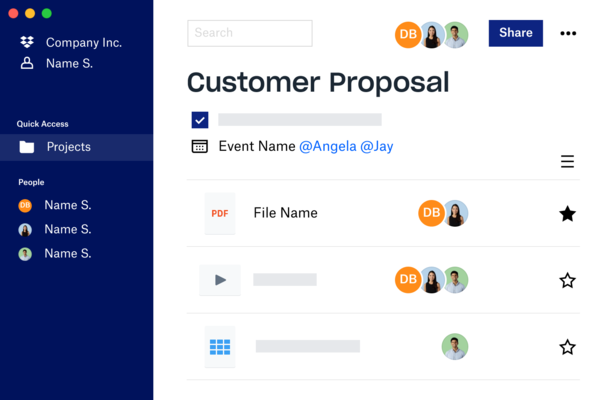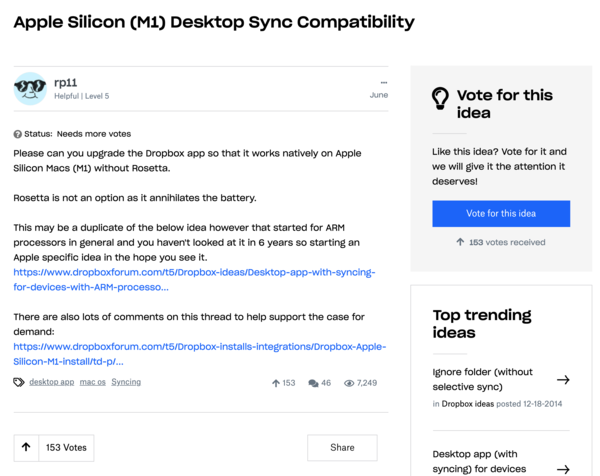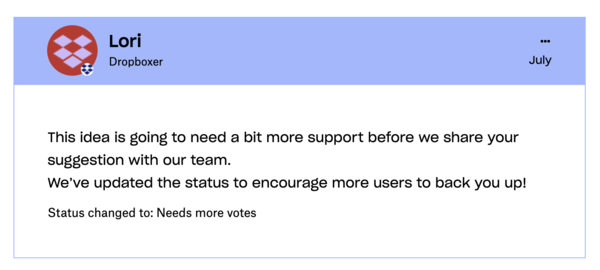
(via the Dropbox website)
With all the hubbub around Apple Silicon since last week, it got me thinking again about the apps that I use that are still Intel and are relying on the M1’s Rosetta 2 emulation layer … and the potential impact they may be having on my own experience.
There are some notable gaps: Duet Display still doesn’t have a native version despite being designed to integrate with an ARM-based app, and there are some random tools that I use that aren’t yet making the leap. (Shout-out to Krisp.) Music apps like Tidal are notable laggards as well.
But honestly, the biggest one is Dropbox, a tool that I’ve used regularly for about a decade now, and has been an essential part of my workflow for many years. In the case of Duet Display or Tidal, those are apps that are designed to be used somewhat infrequently, Dropbox is basically an essential thing to use for many people—something that’s on in the background nearly all of the time. It was one of the first apps I loaded onto my M1 MacBook Air, and I regaled the painful tale for all to enjoy.
I have tried to make Dropbox work despite it using Rosetta 2 because of some key features I use that I would like to have access to (particularly offline-only). But over the weekend, I did something I didn’t think I would do—I installed Maestral, the open-source Dropbox client that literally released an Apple Silicon version six months ago. I immediately saw a significant improvement in battery life.
But the annoyance with this issue is quite strong given the fact that Dropbox is something I pay for and the fact that the app is a heavy consumer of resources, meaning that it’s likely costing me battery life that I otherwise would still have available.


An actual thread on the Dropbox forums I came across over the weekend, along with an official reply from Dropbox. Seeing that reply is the first time I’ve ever thought of cancelling my service with them.
The part that’s most frustrating about it is that most of its competitors at this point have largely moved over and started the Apple Silicon transition, including Google Drive and (most recently) Box. Dropbox has made barely a peep on Apple Silicon support, and their support people are commenting on their forums in ways that imply that it’s not a priority for them.
Speaking as a consumer: When I pay an annual bill of more than $100 to use something, that’s not the kind of thing I want to hear from your company. It makes it seem like you aren’t actually listening to your customers when they say your software is killing their battery life.
So what’s the root cause here? Why the lag? My best guess is that it’s architectural and would require a significant rewrite, but rather than telling customers that, they’re choosing a policy of opacity.
(Also a potential factor: Dropbox seems focused on launching a bunch of new tools that seem pretty far removed from their core product line.)

Maestral, an open-source variant of the Dropbox client that has natively supported Apple Silicon for more than six months. It is primarily developed by one person.
About that architectural change: Earlier this year, Apple blogger Jason Snell highlighted how Apple’s new File Provider framework is likely to make cloud platforms work more consistently and efficiently—with an early third-party tool, StrongSync, leveraging the shift early. But it comes at a cost: Basically, Dropbox and every other cloud provider (as well as anything that needs system extensions to work) has to rewrite their applications to make them properly work in this new environment. Apple had changed its security rules in a way that effectively deprecated the old system of kernel extensions. This caused problems for certain tools, most notably Box, which required lower security settings to even be installed before the recent update. (I also, frustratingly, had to do something similar to set up an app I use that I really like and use for recording interviews, Rogue Amoeba’s Loopback.)
Dropbox has made some moves in the direction of being the tool you use to back up your hard drive, a direction that seems philosophically opposed to Apple’s world of increased security. But at the same time, it’s been a year, Dropbox is a sizable company, and the Mac is one of their biggest user bases—they should have figured this out, or at least offered some sign that they were working on it, by now. But they haven’t.
To Apple Silicon laggards: Read up on the story of Quark, and how they killed goodwill with Mac users by dragging their feet on an important update—allowing InDesign to quickly steal its market share. You don’t want to be the Apple Silicon version of Quark.
Time limit given ⏲: 30 minutes
Time left on clock ⏲: 1 minute, 29 seconds



